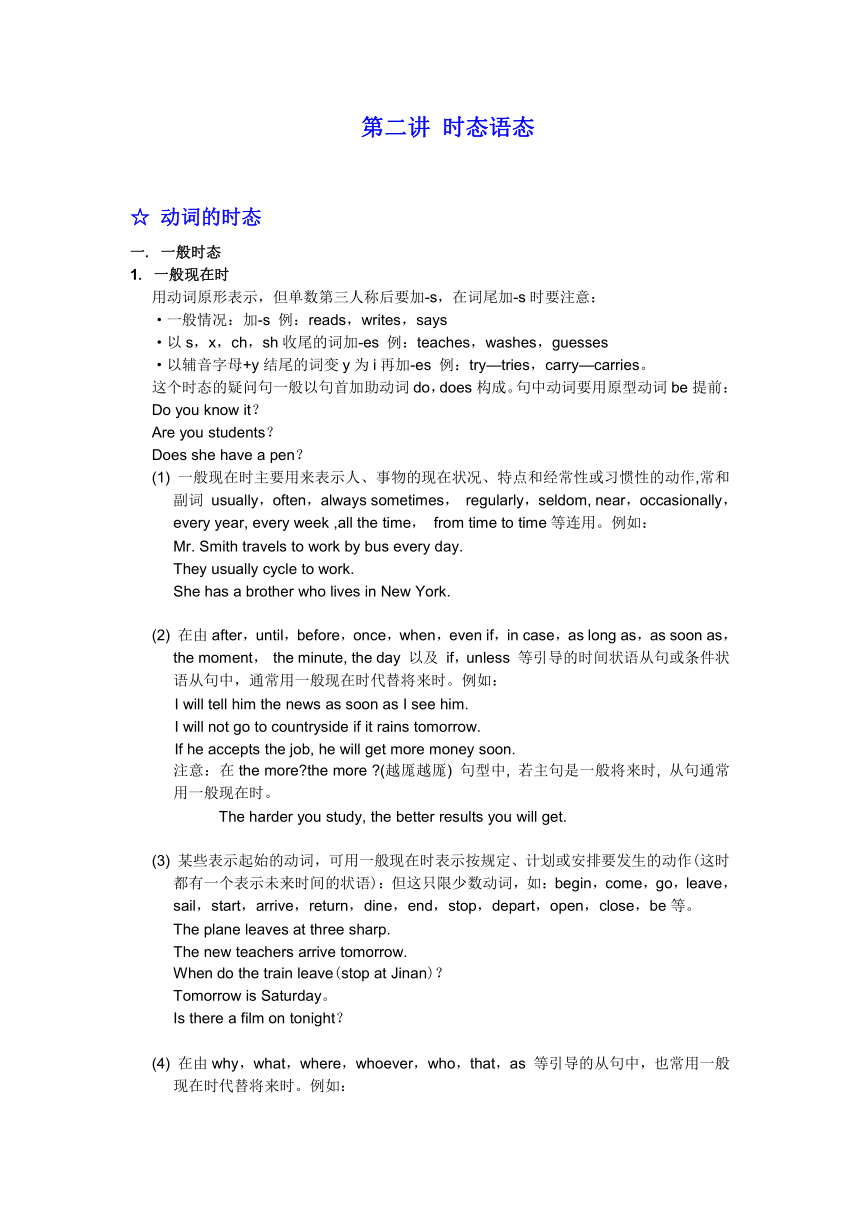
第二讲 时态语态 动词的时态 一. 一般时态 1. 一般现在时 用动词原形表示,但单数第三人称后要加-s,在词尾加-s时要注意: ·一般情况:加-s 例:reads,writes,says ·以s,x,ch,sh收尾的词加-es 例:teaches,washes,guesses ·以辅音字母+y结尾的词变y为i再加-es 例:try—tries,carry—carries。 这个时态的疑问句一般以句首加助动词do,does构成。句中动词要用原型动词be提前: Do you know it? Are you students? Does she have a pen? (1) 一般现在时主要用来表示人、事物的 出卷网现在状况、特点和经常性或习惯性的动作,常和副词 usually,often,always sometimes, regularly,seldom, near,occasionally,every year, every week ,all the time, from time to time等连用。例如: Mr. Smith travels to work by bus every day. They usually cycle to work. She has a brother who lives in New York. (2) 在由after,until,bef 出卷网ore,once,when,even if,in case,as long as,as soon as,the moment, the minute, the day 以及 if,unless 等引导的时间状语从句或条件状语从句中,通常用一般现在时代替将来时。例如: I will tell him the news as soon as I see him. I will not go to countryside if it rains tomorrow. If he accepts the job, he will get more money soon. 注意:在the more the more (越厖越厖) 句型中, 若主句是一般将来时, 从句通常用一般现在时。 The harder you study, the better results you will get. (3) 某些表示起始的动词,可用一般现在时 出卷网表示按规定、计划或安排要发生的动作(这时都有一个表示未来时间的状语):但这只限少数动词,如:begin,come,go,leave,sail,start,arrive,return,dine,end,stop,depart,open,close,be等。 The plane leaves at three sharp. The new teachers arrive tomorrow. When do the train leave(stop at Jinan)? Tomorrow is Saturday。 Is there a film on tonight? (4) 在由why,what,where,whoever,who,that,as 等引导的从句中,也常用一般现在时代替将来时。例如: Free tickets will be given to whoever comes first. You’ll probably be in the same train as I am tomorrow. (5) 表示客观规律和永恒真理等: Light travels faster than sound. Two and four makes six. The moon moves round the earth. 注意:表示永恒的真理,即使出现在过去的语境中,仍用一般现在时。如: I learned tha 出卷网t the earth goes around the sun when I was in primary school. (6) 有些表示状态和感觉的动词常常可 出卷网用于一般现在时:be,love,like,hate,want,hope,need,prefer,wish,know,understand,remember,believe,recognize,guess,suppose,mean,belong,think(以为),feel,envy,doubt,remain,consist,contain,seem,look(看起来),see,fit,suit,owe,own,hear,find,suggest,propose,allow,show(说明),prove,mind(在意),have(有),sound(听起来),taste(尝起来),matter,require,possess,desire等等。 I feel a sharp pain in my chest. The soup contains too much salt. You see what I mean? The coat fits you very well. How do you find the book? 一般现在时考点分析: ① 表示客观事实或普通真理(不受时态限制) Water boils at 100℃. ② 表示现状、性质、状态时多用系动词或状态动词;表示经常或习惯性的动作,多用动作动词,且常与表频率的时间状语连用。 Ice feels cold. We always care for each other and help each other ... ...
~~ 您好,已阅读到文档的结尾了 ~~

